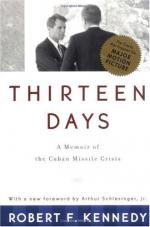
|
| Name: _________________________ | Period: ___________________ |
This quiz consists of 5 multiple choice and 5 short answer questions through Thirteen Days, pgs. 35-61.
Multiple Choice Questions
1. According to Robert in the section, "It was now up to one single man," what did JFK stress in his speech to the nation?
(a) The blockade was the initial step.
(b) The U.S. was not yet in danger.
(c) The surgical air-strike was the initial step.
(d) The U.S. would invade Cuba.
2. What type of non-fiction is Thirteen Days?
(a) Memoir.
(b) Essay.
(c) Biography.
(d) Textbook.
3. Who said, "if the Russians' response makes a military action or invasion inevitable, I want to be able to feel that we will not have to waste any days having to get ready" (47).
(a) General Shoup.
(b) JFK.
(c) General LeMay.
(d) Secretary McNamara.
4. When looking at the first photographs of the missile bases in Cuba, what did JFK say it looked like?
(a) Farm.
(b) Soccer field.
(c) Swimming pool.
(d) Football field.
5. What did Robert suggest JFK do on September 4th regarding the possibility of Russia placing missiles in Cuba?
(a) Issue a statement of good will.
(b) Threaten Soviet Chairman Nikita Khrushchev.
(c) Issue a statement that it would not be tolerated.
(d) Bomb Cuba.
Short Answer Questions
1. What did Robert sarcastically claim to be the advantage to being wrong in the case of military action?
2. Who publicly confronted Soviet Union Ambassador V. A. Zorin?
3. Against what strategy was the following argument used: It would be like "closing the door after the horse has left the barn" (28)?
4. What was Robert's main argument against a surprise attack?
5. What does Robert claim was impossible for Ex Comm to come up with when making their recommendations to JFK?
|
This section contains 314 words (approx. 2 pages at 300 words per page) |

|




